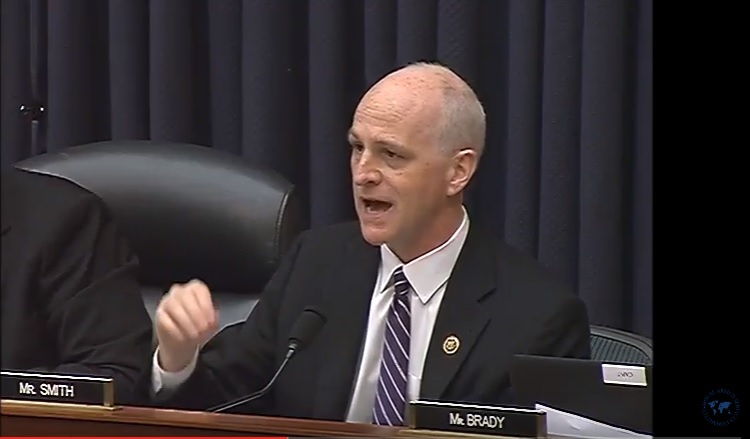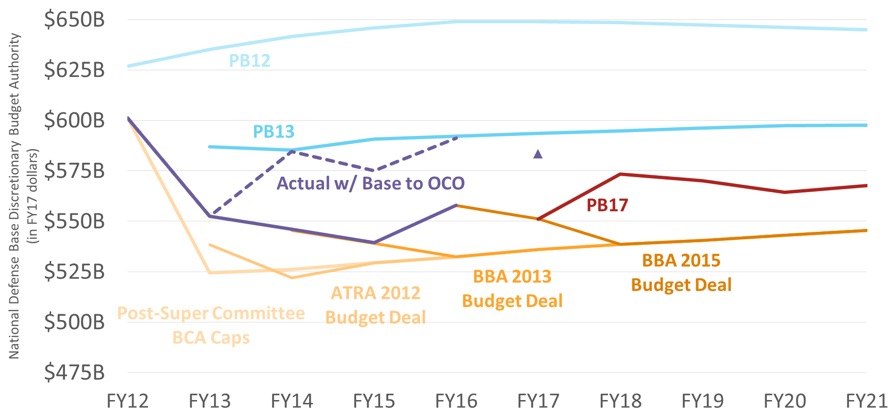‘So Fricking Stupid’: Adam Smith Predicts Year-Long CR
Posted on

Rep. Adam Smith
UPDATED with more from Rep. Smith WASHINGTON: The congressional budget process is headed for “a complete meltdown” in December, and the most likely outcome is a year-long Continuing Resolution, the top Democrat on the House Armed Services Committee believes. The government is already on a three-month CR until December, which is bad enough, said a visibly frustrated Rep. Adam Smith, but a full-year CR would be “borderline legislative malpractice, particularly for the Department of Defense.”

Sen. John McCain and Rep Mac Thornberry, chairmen of the Senate and House Armed Services Committees
Traditionally used as short-term stopgaps, CRs effectively set government on autopilot at last year’s spending levels, with minimal ability to start, stop, or modify programs to reflect changing needs. The situation is so dire it’s generating bipartisanship. Rep. Smith agreed with HASC chairman Mac Thornberry and Senate Armed Services chairman John McCain that years of CRs and Budget Control Act caps have “undeniably” contributed to training cutbacks, maintenance shortfalls, and ultimately fatal accidents like those that have killed 42 servicemembers just this summer.
What’s the budget train wreck, according to Smith? The strong Republican majority in the House has passed a defense bill that goes $72 billion over the maximum allowed by the 2011 Budget Control Act. That would trigger the automatic cuts called sequestration unless the BCA is amended, as it has been in the past. But the slim GOP majority in the Senate needs Democratic votes to amend the BCA, and the Dems won’t deal unless non-defense spending rises as much as defense – which is anathema to Republican hardliners in the House.
Unless House Speaker Paul Ryan is willing to wage civil war within his caucus, the result will be deadlock. Deadlock on the regular appropriations process means the only alternatives are passing a Continuing Resolution or shutting the government down – indefinitely.
“Do you understand just how fricking stupid that is?” Smith asked, having stopped at one point in his talk to remind himself not to swear on camera. “It is mind boggling….There is no coming back from this…. What are they going to do in December?”

More and more defense expenses are being labeled as emergency, off-budget “Overseas Contingency Operations” (OCO) funds for the wars in Afghanistan (above) and Iraq.
Smith did admit one last alternative: shifting all the extra money from the regular defense budget to the off-budget war funds – Overseas Contingency Operations (OCO) – which are exempt from the Budget Control Act caps. There’s even precedent, because Smith’s own chairman, Mac Thornberry, already moved billions into OCO in the HASC’s own bill earlier this year. But such a fiscal sleight of hand would be bad governance and “hypocritical,” Smith said.
Admittedly, Smith isn’t a member of the House leadership or the House Appropriations Committee, which will negotiate the final numbers with the Senate. He’s the top Democrat on the HASC, which authorizes spending but can’t actually write anyone check (i.e. appropriate). Smith is a veteran of 20 years on the usually bipartisan Armed Services Committee, however. He’s also one of the most candid – not to mention snarky – members of Congress on budget matters. Smith’s remarks this morning were blunt and depressing even for him.
“Here’s how bad it is — and I can’t believe people haven’t written more about this,” Smith said. “We are headed towards a complete meltdown at the end of this year.”
“I always search for optimism in the world but… it’s really worse than it looks when it comes to the budget,” Smith said. People praise last week’s unexpected bargain – which blindsided Ryan and other GOP leaders – by saying “oh we got a three-month deal and the Democrats talked to Trump and isn’t that great,'” Smith said in a mocking voice. In fact, he said, all that deal means is “we have been driving towards the edge of a cliff and last week we decided to slow down to 30 miles an hour from 50.”

Three budget deals to lift BCA caps, and Overseas Contingency Operations (OCO) spending exempt from camps, have softened the impact of the Budget Control Act. (Todd Harrison graphic)
Beyond BCA: Not Just ‘Stupid’ But ‘Craven’
Smith had thought, he said, that “Congress would not be so stupid as to pass appropriations bills that exceeded the budget caps without also changing the Budget Control Act so those excesses wouldn’t automatically be cut back. I underestimated the stupidity of Congress.”
“It isn’t stupidity,” he corrected himself at once. “I wish it was stupidity. On a certain level, stupidity can be fixed.”
Instead, “it was craven politics,” Smith said. “The reason Republicans passed the defense bill that exceeded the budget caps by $72 billion and didn’t change the Budget Control Act (is that) they wanted to be able to say as Republicans, ‘we’re tough on defense, we’re spending money on defense,’ and they also wanted to be able to say, ‘we are fiscally responsible, we are sticking to the budget caps.'”

Rep. Adam Smith
The problem is that if you raise defense, you have to break the caps, and if you don’t break the caps, you can’t raise defense. “It has to add up,” Smith fumed. (He’s nearly as scathing about his fellow Democrats, who want to raise non-defense spending without paying for it).
With the current Continuing Resolution expiring December 8th, we’re headed for a collision between the defense budget and the budget caps with no clear way out. “They don’t have the first fricking clue what they’re going to do,” Smith said of the GOP leaders. “They just keep hoping to get through the day” – but there are only 86 days left before the CR expires and we hit the wall.
Even if Congress and the White House do find a way to once again bypass the Budget Control Act – even if they repeal the BCA altogether – that’s just beginning to crawl out of the fiscal pit we’ve dug for ourselves, Smith said.
“Budget caps or no budget caps, we’re $20 trillion dollars in debt. We are running a deficit of $700 billion, and it is projected to go up, not down,” he said. “Getting rid of budget caps does not make money magically appear.”
The inverse of the untamed and growing debt is an untamed and growing appetite for defense spending. If you added all the stated needs and official priorities together, Smith estimated, “you’d have to have an $800 billion a year defense budget to make that work.”

Smith argues against spending to replace the aging nuclear-tipped Air-Launched Cruise Missile (ALCM).
Smith personally thinks we can get a lot more bang for our current defense buck, especially if we close some military bases and cancel some nuclear weapons (both highly controversial), although there are no easy cuts. But no one really knows the full cost of our current strategy, to the extent we have one. One briefer from the Pentagon’s influential and secretive Office of Net Assessment told Smith that “we do not have the money to fund the strategy that we put in place in 2012,” the congressman recalled. “And I said, ‘how much would you need?’…. He had no idea.”
The same inability – or unwillingness – to count the costs afflicts every area of federal spending, from defense to entitlements to domestic programs, said Smith, who argues for raising taxes. “We’ve been able to fool ourselves into running campaigns where we basically lie to the American people” by making promises that can’t possibly add up, he said. “There is nothing Congress that can vote for that won’t be hated by the American public, because anything that we vote for cannot balance the budget, cut taxes, and increase spending. It won’t because it’s impossible.”
In the long term, this refusal to face facts undermines the economy. In the shorter term, Smith said, as training, maintenance, and basic safety get shortchanged, “the men and women who serve in the military are going to be suffering.”
Subscribe to our newsletter
Promotions, new products and sales. Directly to your inbox.
